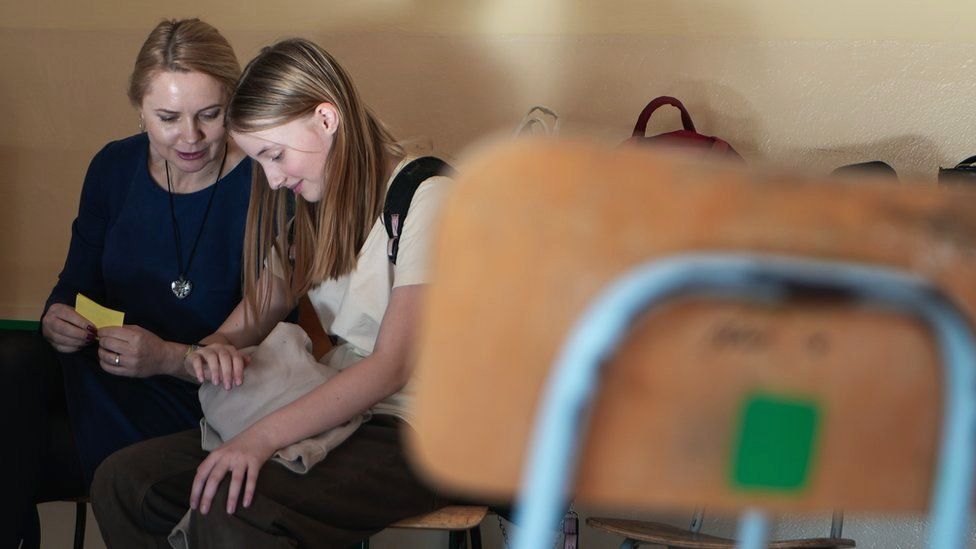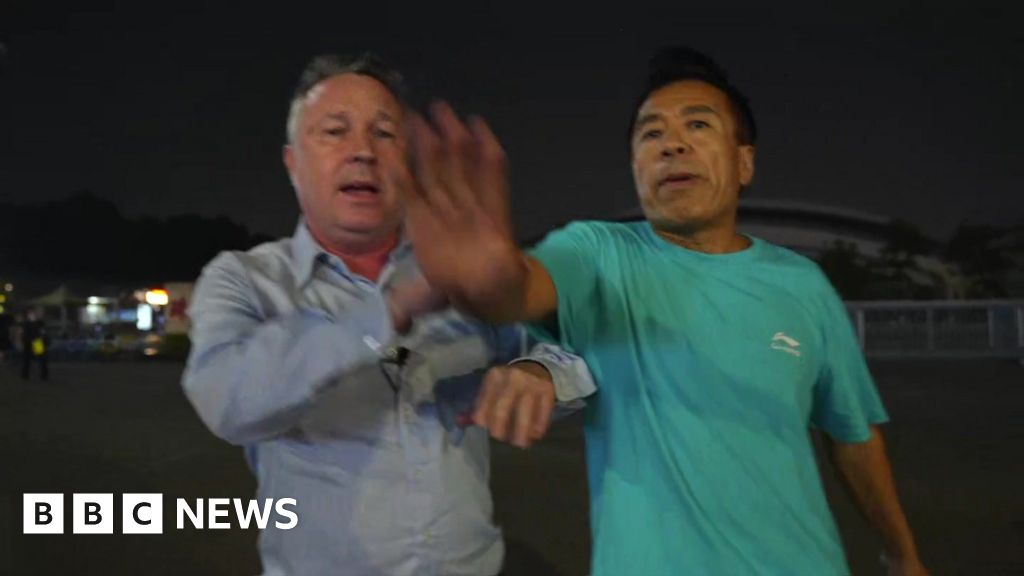ARTICLE AD BOX
 Image source, Bruno Boelpaep/BBC
Image source, Bruno Boelpaep/BBC
Psychologist Tetiana Boiko (left) has a conversation with 11-year-old Ukrainian Sofiya at a school in Przemysl, Poland
By Sarah Rainsford
Eastern Europe correspondent, Przemysl, Poland
For Ukrainians fleeing Russia's invasion of their country, the railway to Przemysl is a lifeline.
Every day for almost a year, trains have been pulling into Platform 5 carrying families from Ukraine to Poland, from war to safety and peace.
The carriages are far less crowded than in the earliest, panic-filled days, but the refugees are still coming.
This week, many said they were driven by fear that Vladimir Putin will mark the first anniversary of his war by ordering a new, deadly offensive.
Olga and her family spent one and a half months under Russian occupation when the war started.
She decided to leave northern Ukraine now because she couldn't face the same hardship all over again: the constant shelling and fear.
In March, trapped in their town - surrounded by fighting - they had to cook what little food they could get on open fires in the streets.
Image source, Bruno Boelpaep/BBC
Image caption,Olga (not pictured), her teenage children and the family dog, Arnold, left Ukraine because of fear of a new Russian attack
"We'll go back when it's safe. When a missile won't hit as we sleep, as is happening all over Ukraine now," Olga tells me in a corner of an abandoned Tesco supermarket.
Nearby, her two teenage children lie on camp beds, glued to their phones, with Arnold the dog curled up next to them.
The old shopping mall initially sheltered several thousand refugees, fed and supported by volunteers who rushed to the border area to help. Now up to 300 people are allowed to stay two nights at most before moving on.
So Olga is taking her children to Germany, where she knows the language a little and hopes to find work.
"We used to think about the future and make plans, but people feel lost now. We look to the future and see nothing." That's how she describes the mood back home in Slavutych, where she talks of seeing the funerals of too many local young men killed on the frontlines.
She had to leave her own eldest son behind, anxious to get his younger brother out of Ukraine before he too turns 18 and becomes eligible to fight.
BBC
These people still need help. Their stories are heart-breaking
Anna Misniak, who helps run the Przemysl aid centre for the Red Cross, worries that people away from the war zone have become numb to what's happening after their initial deep shock.
"I think people got used to the fact that there is a war and they've gone back to normal life. But these people still need help. Their stories are heart-breaking," Anna says, as she recalls meeting a woman who had crossed the border in her flip-flops the previous week.
Almost four million refugees entered Poland in the first three months of the war. Many have returned home, others moved on to other countries, but about a million are currently registered in this country as refugees.
The population of Przemysl alone has increased by roughly 10%, but aid workers, local officials and Ukrainians themselves agree that the warm Polish welcome has not cooled.
"The reaction of citizens in Przemysl was incredible," local mayor Wojciech Bakun says, adding that a year on, up to 70% of the new arrivals from Ukraine have found work and are renting flats.
"They try to live as normal. That's very important for us too. They integrate well and I think that's why we don't have a disaster in Poland."
That solidarity and support is especially notable in these borderlands, where historic animosity between Poles and Ukrainians is deep-rooted.
"We are writing our own history now. Maybe in 2150, someone will learn about 2022 and how good relations were in this time," Mr Bakun suggests.
Image source, Bruno Boelpaep/BBC
Image caption,People queue on the platform at Przemysl station with free tickets for an evacuation train to Hanover, Germany
For 11-year-old Sofiya, attending her local Polish school has helped her adjust to life as a refugee. A year after arriving from Kharkiv, close to the Russian border, she joins in her classes with gusto.
The government here still gives refugees access to all state benefits including free healthcare and education, although it is phasing out some cash subsidies.
Sofiya has learned Polish - "a mixture of Russian, Ukrainian and some funny words," as she puts it - and shows no outward sign of the fear she admits made her "tremble all over" when her city came under heavy Russian fire.
She and her mother huddled in the basement then with her dog, cat and pet squirrel.
"They said it was war, but I didn't understand at all," Sofiya tells me, plucking at her watch strap. "There were just 'booms' out on the street."
These days, she says she focuses on her schoolwork.
"I try not to think about Ukraine too much and how much I'd like to go back there, because if I do, I'll burst into tears. I think about what's happening now, not about the future. That helps calm me down a bit."
Today there are 23 Ukrainian children at Sofiya's school, about a third of the number attending at the peak, but staff still keep a close eye on them.
They're helped by a foundation called Pro-Fil which takes child psychologists even to remote regions, but says more are needed, especially Ukrainian speakers.
"I help people to live in the here and now and to accept the situation," explains Tetiana Boiko, a refugee herself who now works with Pro-Fil. She says that, too, has helped her to cope.
"Yes, there is a war, yes, we are here. But I tell people they need to try to accept that and to take some pleasure from everyday life: the fact they see the sun, the snow, their children. That they're not in a basement thinking they might die, but can live a full life here and now."
For Olga and her children, Poland is just a transit stop. After one night in the shopping centre shelter, they join the throng at Przemysl station with free tickets for an evacuation train to Hanover.
Arnold the dog whimpers on his leash as volunteers shout instructions that few seem to hear or heed.
They include an English girl on her Russian-language study year and a Russian man who opposes the war being waged by his country, but can't protest at home without being arrested.
On a wall, there is a plea to help find Murka, a refugee's pet cat who made it from Ukraine, but escaped her crate during transit.
"I'm a bit scared because of the uncertainty over where we'll end up and how it'll be," Olga admits as she gathers the few belongings the family have brought. "But the main thing is that we're safe."
The volunteers then help the refugees drag their cases along the cold, dark platform and on to the busy train for another journey into the unknown.
"It's still hard to believe this is happening. Even though everyone is kind and good, it's a real stress. The fact is, we're not at home."

 1 year ago
28
1 year ago
28








 English (US)
English (US)